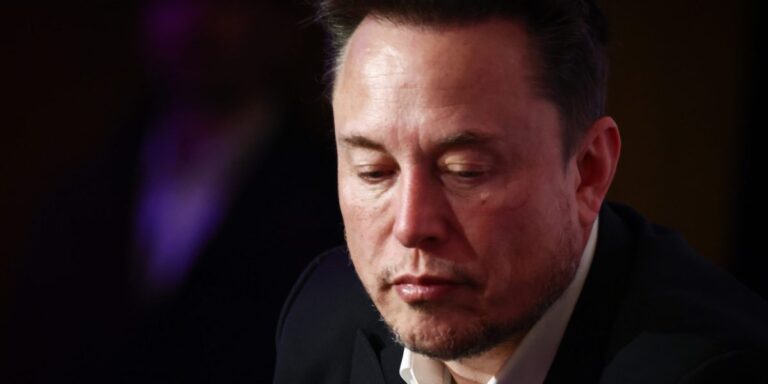Elon Musk’s full support for Donald Trump could hurt Tesla in a number of ways.
His embrace of the former president’s political style has already led to an exodus of customers in California to his direct rival, Rivian, another electric-only automaker founded in the Golden State.
But it could come at a steep price in other ways, too. After the market closed on Tuesday, Tesla revealed that its quarterly profit from EV sales had fallen to its lowest level in five years. Investors were spooked, and the stock got off to a weak start in early trading on Wednesday (its shares were down more than 8% in premarket trading). To make matters worse, nearly half of its pretax profit of $1.89 billion came from the sale of regulatory carbon credits, which could be reduced if Trump is reelected president.
Rohan Patel, who served as Tesla’s global public policy head until April, warned that the Trump administration is doing everything in its power to dismantle California’s carbon credit program and will probably try again.
“One of the main drivers of our revenue this quarter was President Trump’s convention speech, which mentioned us twice as a target for elimination,” Patel wrote on Tuesday.
Tesla made a record $890 million from selling EV credits, a market-based measure to reduce atmospheric carbon dioxide levels by encouraging the uptake of electric vehicles. Essentially, rivals that don’t sell enough EVs to meet a minimum quota can pay a fee to companies that do in exchange for the right to continue selling internal combustion engine vehicles.
A reminder…one of the main drivers of revenue this quarter (GHG and ZEV standards) was mentioned twice by President Trump in his convention speech as being subject to elimination.
From 2017 to 2021, President Trump and EPA leadership did everything they could to dismantle these polluting… https://t.co/gAAr6Ev7Bi
— Rohan Patel (@rohanspatel) July 23, 2024
This extra revenue stream is essentially a net profit, allowing companies to accumulate more credits than they need. For an EV-only company like Tesla that has no internal combustion engine business to offset, the constant flow of lucrative credits has become what the fossil fuel industry calls, for lack of a better word, a “gusher.”
Musk downplays concerns about Trump
Tesla benefited from these regulations when it first began to turn a profit, and critics argued at the time that the company was essentially an EV credit seller with a loss-making auto business.
Credits have become more important recently as a result of Musk’s EV price wars: Tesla’s deep discounting has diluted the profitability of car sales, causing its auto gross margin (excluding credits) to fall to 14.6% for the quarter, its lowest since at least early 2019, according to UBS. What’s more, other automakers that can’t compete with Tesla are scaling back their own loss-making EV businesses, which means they need to buy more credits.
Naturally, Musk, who has never been shy about putting politics above business interests, sought to downplay the risks of supporting Trump.
“There’s going to be some impact,” he acknowledged on Tuesday, “It’s going to hurt Tesla a little bit,” but it’s not that bad because it’s “devastating” for competitors.
GigaMexico construction likely shelved by Trump tariffs
Another big risk posed by President Trump is the Giga Mexico plant in Nuevo Leon, first announced in March 2023. It was supposed to be home to lower-cost car models that would sell millions of units and drive the next wave of a 50% annual production increase.
As EV growth began to slow as demand from early adopters saturate, auto companies began to put off investing in new EV factories, and Musk was no exception: He now says he may shelve plans for the Nuevo Leon plant altogether if his preferred candidate wins.
“President Trump has said he’s going to put heavy tariffs on cars that are made in Mexico,” Musk told investors during an earnings call on Tuesday. “If that’s what’s going to happen, it doesn’t make sense for us to invest so much in Mexico.”
President Trump could help Tesla: The real estate mogul has a negative view of government involvement and sees regulatory guardrails as a straitjacket that stifles entrepreneurial spirit.
The Senate rejected his nomination, leaving the top job at the National Highway Traffic Safety Administration (NHTSA), the federal agency for the auto industry, vacant for the entire duration of his administration.
Trump could help Musk’s robot taxi plan by relaxing road safety regulations
Musk’s support for Trump could give the Tesla CEO a key voice in influencing policymaking at NHTSA, which is expected to play a key role in regulating self-driving cars. The agency, which has a new administrator for the first time in five years, has taken a tougher enforcement approach under the Biden administration.
Musk’s top immediate priority is a dedicated robotaxi model due to be unveiled on October 10. It’s widely expected to be built on a new vehicle architecture designed from the ground up and have no steering wheel or pedals. The problem is that regulators are already grappling with the myriad risks that come with fully self-driving cars. Removing all manual control from the vehicle further complicates the equation.
That’s one of the key reasons GM cited for its robotaxi business Cruise ditching a purpose-built model called Origin in favor of what’s essentially an off-the-shelf version of the next Chevrolet Bolt EV, with more sensors and on-board computing.
When asked how this would affect Musk’s robotaxis, he falsely claimed it wouldn’t be an issue because Waymo already has permits to operate in some cities, but Alphabet’s self-driving car subsidiary uses souped-up Jaguar i-Pace EVs for its robotaxis.

